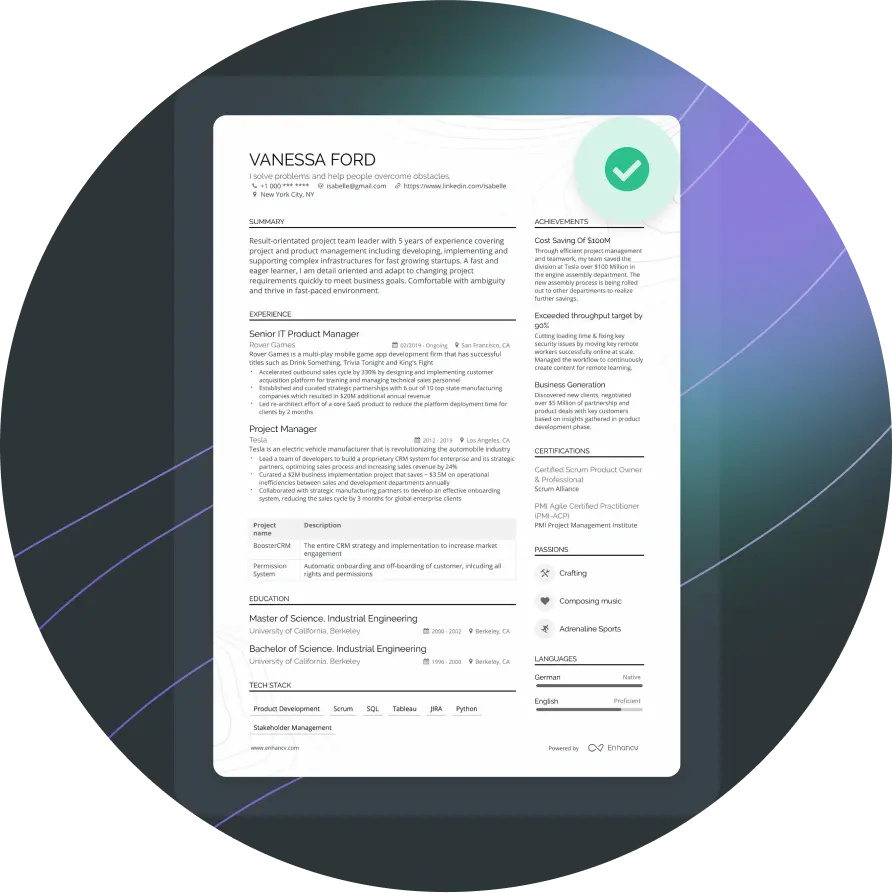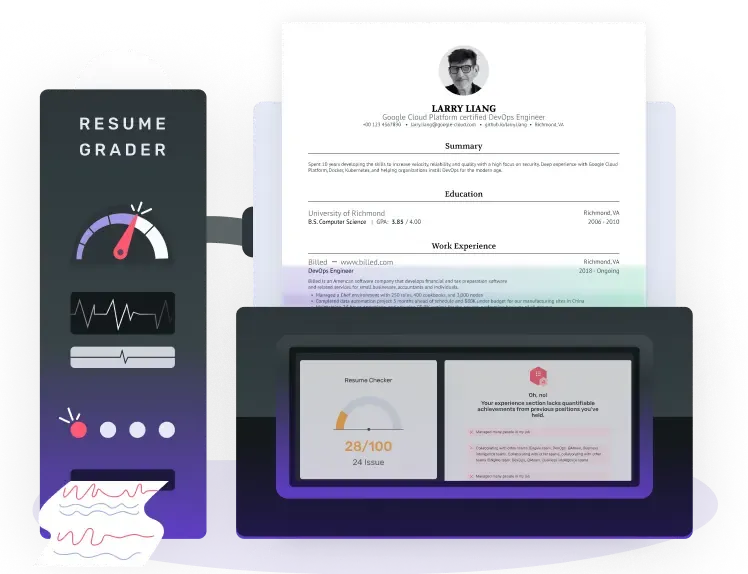
Make sure your resume is keyword optimized to pass the ATS
Enhancv’s Resume Keyword Generator is a free tailored keyword optimization report backed by AI
Job ad keyword extraction
ATS parse rate analysis
Buzzword and cliche detection
Consistency and accuracy
Precise and powerful wording

Enhance your resume with our comprehensive resume improvement toolset
Content Analyzer
Leverage our keyword generator tool to not only identify and correct spelling mistakes but also receive constructive feedback on your resume content. If you've overlooked the inclusion of measurable results, our tool will flag this for you. Drawing from the insights of thousands of successful resumes, it's designed to ensure you're represented in the best possible way on your resume.
Referral Link
Share your resume with individuals who have experience within your target company, ideally in the same department or role. Networking with former employees on LinkedIn can offer priceless insights. Getting their feedback on your resume can be a powerful tool in your job-seeking arsenal.
Should you include keywords on your resume?
Absolutely, including keywords in your resume is crucial for a couple of reasons.
First, many employers use Applicant Tracking Systems (ATS) to screen resumes. These systems scan your resume for relevant keywords that match the job description. If your resume doesn't include enough of these keywords, it might not pass the ATS, regardless of how well your skills and experiences align with the job.
Second, when a human recruiter reviews your resume, they're likely looking for certain skills, experiences, and qualifications. By including keywords from the job description in your resume, you make it easier for the recruiter to see that you have the qualifications they're looking for.
However, it's essential to use keywords appropriately. Don't simply stuff your resume with keywords; ensure they're used in context and accurately reflect your skills and experiences. Also, try to use exact phrases or terminology used in the job description, as the ATS may not recognize synonyms.
In conclusion, using the right keywords can significantly increase the chances of your resume being noticed and getting you to the interview stage, and here’s where Enhancv’s resume keyword generator can help.
What are resume keywords?
Resume keywords are specific words or phrases that employers look for in job applications. These keywords help employers and Applicant Tracking Systems (ATS) identify whether a candidate possesses the qualifications needed for the job. They typically fall into several categories:
Job Titles: These could be the titles of jobs you've previously held, or the title of the job you're applying for.
Skills or Abilities: These are specific competencies that are relevant to the job, such as "project management," "data analysis," "customer service," "programming," etc.
Qualifications or Certifications: This could include academic degrees (like "MBA"), professional licenses (like "Certified Public Accountant"), or other relevant certifications (like "Project Management Professional").
Software and Tools: If the job requires proficiency in certain software or tools, such as "Microsoft Excel," "Python," "Adobe Photoshop," or "Salesforce," these should be included as keywords.
Industry Terms and Jargon: Every industry has its own language. Using the appropriate terminology can show you're familiar with the field. For example, in marketing, you might include terms like "SEO," "content marketing," or "conversion rate optimization."
Company Values: Some companies may look for keywords that align with their mission or values, such as "sustainability" or "customer-centric."
When identifying resume keywords, a good starting point is the job description. It usually contains the most important keywords employers are looking for and that’s why out resume keyword generator also works best when you paste the job ad you’re applying for. But remember, the key is to use these words naturally and honestly. Misrepresenting your abilities or qualifications is never a good idea.
Are job posting verbs considered resume keywords?
Yes, job posting verbs can be considered resume keywords.
Job postings often include specific action verbs that describe the desired skills, qualifications, and responsibilities for a particular job. Including these relevant verbs in your resume can help you align your qualifications with the employer's requirements and catch the attention of hiring managers or applicant tracking systems (ATS) that scan resumes for specific keywords.



